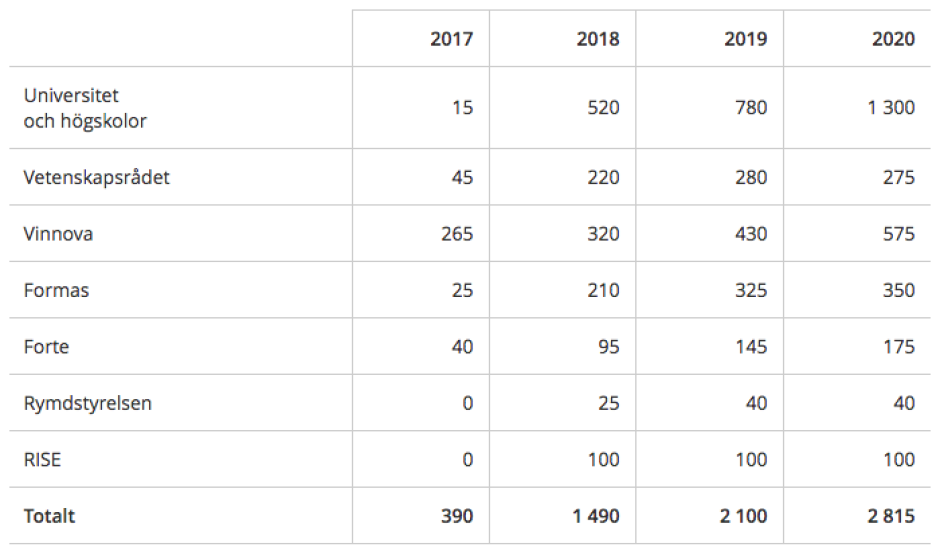Lighthouse thoughts on the Swedish research bill

In the Swedish government research bill, presented by Helen Hellmark Knutsson, Minister for Higher Education and Research, Lighthouse likes the ambition of increase investment in strategic areas of innovation and that the importance of testbeds are highlighted.
In the research bill, the Swedish government gives its views on research and innovation in a ten-year perspective, with particular focus on investments from 2017 to 2020. The bill has a strong focus on collaboration between academia, business and society, and prioritising research into the climate and environment, health and life sciences and increased digitisation.
- We have great expectations that research and innovation really will happen in these areas and the bills triple helix perspective is very positive. Collaboration between industry, academia and institutions and the community is very important, Åsa Burman, Director of Lighthouse, says.
Strengthening of strategic innovation areas
Strategic areas of innovation were introduced by the government in 2012 and is an initiative in which leading stakeholders from industry, academia and the public sector itself identifies and defines areas where they see the need of Swedish joint efforts and actions. In the bill the government writes:
"For the next decade, the government's ambition is that digitisation should permeate all cooperation programs and the strengthening of strategic innovation areas are distributed fairly evenly between five cooperation programs."
Shipping is included in the cooperation program, The next generation of travel and transport, and the programme is seen as an important part to meet societal challenges such as employment, environmental and health impacts and climate change. The government writes:
"The cooperation program for the next generation of travel and transport is a step to meet the challenges for a robust road and rail systems, as well as a well-developed, innovative and competitive maritime and air transport. At the same time the cooperation programme can contribute to future opportunities for digital mobility services as well autonomous and connected vehicles and ships. "
- There are still no programs directly targeted at the maritime field, but it is positive that shipping takes place in cooperation programs and other initiatives within the research bill. It is a step in the right direction, Åsa Burman says.
Competitive maritime sector
"The Government's aim is for Sweden to have competitive, innovative and sustainable maritime industries which can contribute to increased employment, reduced environmental impact and an attractive living environment. Working together for a strong Swedish shipping is important for the Government's ambitions to increase Swedish exports to emerging markets.", the research bill states.
- It is very important to have a strong Swedish shipping which is both competitive and sustainable. There are also many marine technology companies which mainly exports its products and that are big on the world market. They are an important part of the maritime sector and R & D efforts must also include these activities, Åsa Burman says.
Raising the basic grant
For higher education institutions', basic grants will be increased by 1.3 billion by 2020. The Government's objective is not to increase the number of researchers, rather the aim is to improve quality and provide greater scope for research in employment and a clear career structure.
- All Swedish universities and colleges must have a reasonable chance to pursue higher education on a scientific basis and build strong and profiled research, says Helene Hellmark Knutsson, Minister of Higher Education and Research in the Government press release.
Test and demonstration facilities
At the beginning of the year, the government launched Testbed Sweden in order to encourage new ideas and solutions to be tested in Sweden. The research bill's investment in test and demonstration environments are closely linked to Testbed Sweden and has a primary focus on testbeds in real environments.
- The maritime sector wants testbeds and it is very positive that the government highlights the transport sector as an important area where testbeds may play a role. In our work for a Swedish effort in smart ships, we need to test autonomous technology, Åsa Burman says.
- It will be very interesting to see the appropriation directions for the various authorities, how they shall effectuate the research bill's intentions, and the maritime strategy which came last year. We also have high hopes for the upcoming energy bill. Energy efficiency, ship fuels and propulsion are vital issues for the future of shipping, Åsa Burman continues.
Text: Andreas Kron
Related content:
-
 NextWave – en podd som ska locka unga
NextWave – en podd som ska locka unga -
 Ny studie: Eldrivna pendelbåtar kan effektivisera Stockholms kollektivtrafik
Ny studie: Eldrivna pendelbåtar kan effektivisera Stockholms kollektivtrafik -
 Sjöfartens utsläpp ökar
Sjöfartens utsläpp ökar -
 Sociala relationer påverkar val av bränsle
Sociala relationer påverkar val av bränsle -
 Sjöfartens omställning kräver ”mjukare” påtryckningar
Sjöfartens omställning kräver ”mjukare” påtryckningar -
 Hon hade avtalad tid med Kapten ynkrygg
Hon hade avtalad tid med Kapten ynkrygg -
 Lighthouse omvärldsanalys 2025 – osäkerhet och tullar präglar sjöfarten
Lighthouse omvärldsanalys 2025 – osäkerhet och tullar präglar sjöfarten -
 Se seminariet Shipping in the Marine Environment
Se seminariet Shipping in the Marine Environment -
 Vad betyder egentligen de 90 procenten?
Vad betyder egentligen de 90 procenten? -
 Hålla där...
Hålla där...

